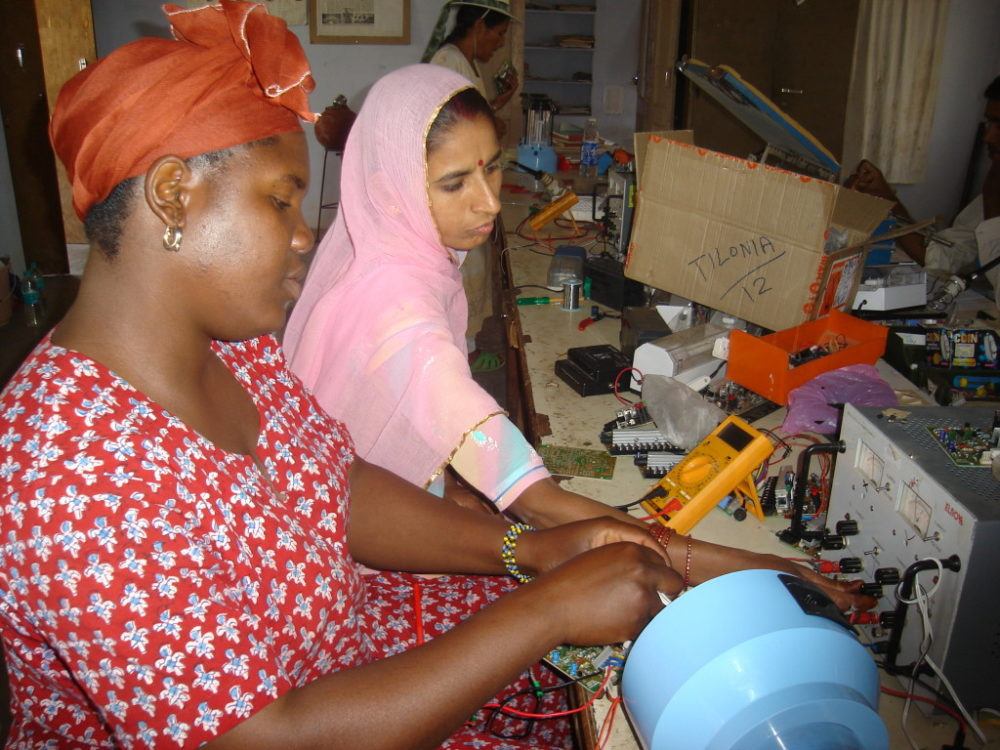
Barefoot College: bringing light to children in Colombia
There are more than 1.3 billion people worldwide without access to electricity and the majority of these people live in rural areas. The Barefoot College (BC) is improving the lives of the rural poor people and their children in the least developed countries by providing access to solar energy. BC trains illiterate rural women (mothers and grandmothers) to become solar engineers. These women solar electrify their villages and also become responsible for the maintenance. BC has successfully trained 700 Barefoot solar engineers, solar electrified 1,015 villages in 49 countries providing clean energy to over 450,000 people, and saving 5.5 million liters of kerosene per year. Funds raised during the Xmas campaign will go to the solar electrification project in Colombia.
Impact
Impact of the Barefoot approach worldwide :
- 1 MW (megawatts) solar panels installed for rural domestic lighting benefiting over 450,000 people.
- 700 illiterate women Barefoot Solar Engineers trained for installation, repair and maintenance.
- Saving 5.5 million litres of kerosene per year in lighting.
Beneficiaries
Beneficiaries are children, women and men living in rural poor communities. In particular, illiterate poor, physically challenged mothers and grandmothers.
Over 450,000 people in 1015 villages in 49 countries are benefiting from solar domestic lighting
Sustainability
ECOLOGICAL:
A solar lighting system is a clean energy source for the rural community. For 35,000 houses lighting 1 Megawatts SPV panels have been installed which saves 5 million litres of kerosene in a year.
ECONOMIC:
A poor family could easily afford $1 per month (depending on the region up to $8 for kerosene lighting or all other costs related to lighting) the same amount is enough for solar lighting unit maintenance. Thus, the approach is affordable and sustainable at the village level.
SOCIAL:
The barefoot approach is replicated worldwide by illiterate, women, physically challenged rural poor communities without involvement of professionals/experts using a simple way of execution and implementation of the approach.
Innovation
The major innovation is demystification of solar lighting circuits for charge controllers, solar lanterns and CFL lamp inverters’ fabrication, testing and repairing by illiterate mothers and grandmothers trained as Barefoot Solar Engineers for a six months program at Barefoot College India. The training is also innovative undertaken without use of oral communication or written materials; utilizing visual and sign language techniques only.
Scalability
SCALE 1: The rural community itself scales barefoot applications from the collective selection of women for training to implementation of any programme in rural parts of the world. Barefoot College does not believe in awarding any formal certificate to the Barefoot Solar Engineers but communities trust in the good performance of Barefoot Solar Engineers for repairs and maintenance of solar lighting units.
SCALE 2: Community regularly contribute for the financial sustainability of the barefoot solution at community level.
SCALE 3: Community controlled, managed and economically afforadable solution for the poor families.
Source of funding
The Barefoot College draws on a mix of resources, such as the Government of India, International funding agencies, private foundations, as well as corporate and individual sponsors, for applying cost-effective and self-sustainable Barefoot solutions in remote, rural villages of India and abroad. For the solar electrification projects Barefoot College uses a Partnership Model where the poor will have to pay monthly for the repair and maintenance and the solar equipment being subsidized that is the bottom up sustainable model.